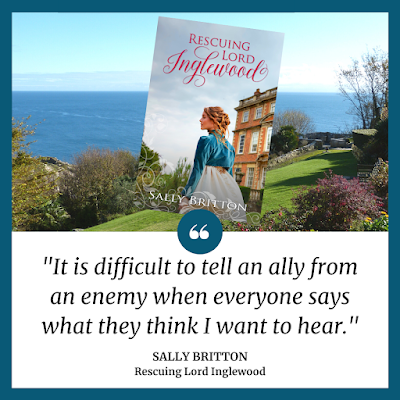Esther Fox has never felt she belonged. She always feels on the outside and other people are always making decisions for her. With her brother Isaac at war, she is forced to live in London with her step-brother. When her quick actions save the life of her brother’s best friend, Silas Riley, Lord Inglewood, in a somewhat compromising manner, the cold earl decides he must marry her to save her reputation. Esther has no say in the matter.
With such an unpromising start to their marriage, can a shared loss draw them together to find love?
A moving story of loss, loyalty and love
Rescuing Lord Inglewood is the first book in the Inglewood series but not the first one I read. I picked up Engaging Sir Isaac (book 4) in a deal last year and ever since reading it, I’ve been looking forward to the rest of the series. I was not disappointed. It was a captivating and easy-to-read Regency romance with a reputation-saving-marriage theme.
I loved reading Esther’s story. It is so true to the period – for women to be free to make so few decisions for themselves, and how trapped that must have made them feel. I really enjoyed the intensity of Esther’s emotions, how Silas gradually opens up, and the moving descriptions of experiencing loss.
The book opens in March 1814. I like to know when a story is set, so for me, this is always the best way to start. There were some nice historical details, such as references to events in the Napoleonic war and to Mrs Radcliffe’s novels, and only a couple of things I stopped to question.
Probably the best recommendation I can give this book is that as soon as I finished it, I started reading the next book in the series.
Night-rails
I’m always interested in new words, and when I came across the word night-rail, I went scurrying to my etymological dictionary. That didn’t help, as there was no mention of the word, but I found an entry in Dr Johnson’s dictionary—spelt without the hyphen—meaning a light kind of nightdress.
Baronets and baronetesses
At one point, Esther refers to her mother as a baronetess—not a term I was particularly familiar with. A little research showed me that it was a perfectly valid use as it can refer to the wife or widow of a baronet, as well as to a woman holding the rank of baronet in her own right.
A little quibble. At one point, Sir Isaac is referred to as a titled lord. Baronet is a hereditary title, but baronets are not peers.
Periods of mourning
Six months is quoted as the usual period of mourning for a sibling. There is plenty of information available about mourning in the Victorian period, but much less about mourning in the Regency. I have started to research this area, but so far have struggled to find any definitive list of periods of mourning in the Regency with satisfactory sources. I will keep searching!
Clean and sweet?
Clean language and low heat level. Some trauma from dealing with grief.
If you have enjoyed this blog and want to encourage me and help me to keep making my research freely available, please buy me a virtual cup of coffee by clicking the button below.
Find more of my reviews of clean/Christian Regency era romance here.



